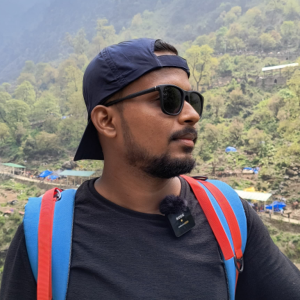Explore the life and legacy of one of India’s most iconic freedom fighters, Subhash Chandra Bose, in this wonderful essay. Learn about his brave acts of defiance, his leadership in the Indian National Army, and his lasting impact on India’s struggle for independence.
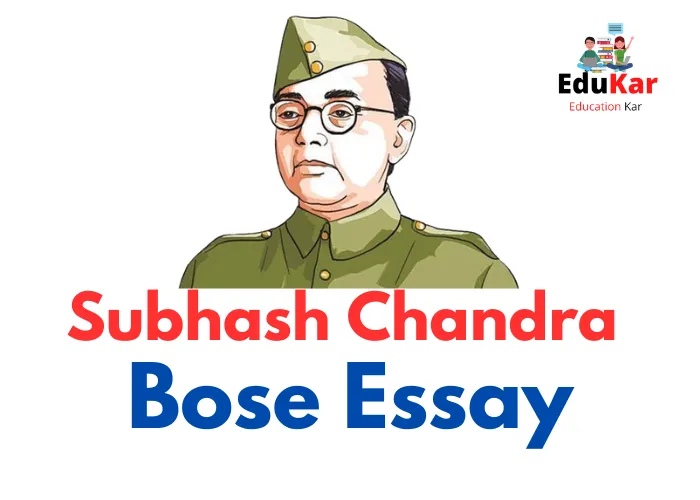
Subhash Chandra Bose Essay in 100 Words
Subhash Chandra Bose was a famous Indian freedom fighter who played a crucial role in India’s struggle for independence from British rule. He was born on January 23, 1897, in Cuttack, Odisha. Bose was a brilliant student and went on to study in England. However, he decided to return to India to fight for the country’s freedom.
Bose was a responsible leader and played a key role in organizing the Indian National Army (INA) to fight against the British. He was fondly called “Netaji” by his followers. Bose’s patriotism and courage continue to inspire generations of Indians even today. His famous slogan “Jai Hind” continues to be used as a patriotic slogan in India.
Subhash Chandra Bose Essay in 150 Words
Subhash Chandra Bose was a great freedom fighter of India. He was born on January 23, 1897, in Cuttack, Odisha. He is also known as Netaji. He had a brilliant academic record and completed his studies in England. He was deeply influenced by Swami Vivekananda’s teachings and was determined to fight for India’s independence.
Subhash Chandra Bose formed the Indian National Army to fight for India’s freedom from British rule. He also organized the Azad Hind Fauj or the Indian National Army to fight for India’s independence from the British. He was a great leader who inspired people to fight for their rights and freedom.
Unfortunately, Subhash Chandra Bose died in a plane crash in August 1945. However, his legacy lives on, and he is remembered as a brave and determined leader who fought for India’s independence. His birthday, January 23, is celebrated as “Parakram Diwas” or “National Day of Courage” in India.
Subhash Chandra Bose Essay in 200 Words
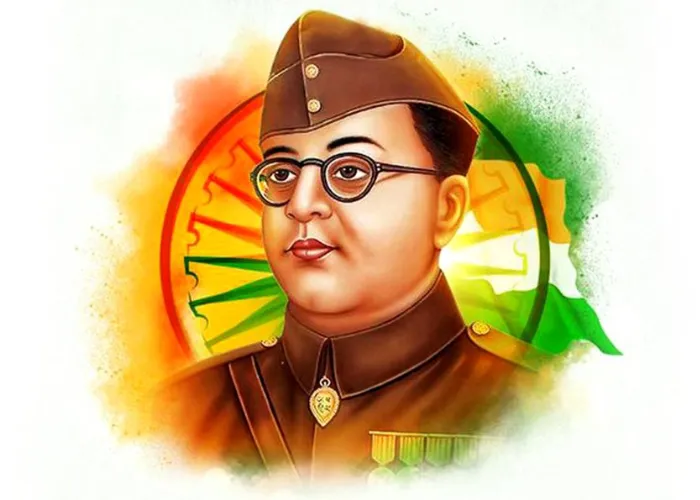
Subhash Chandra Bose, also known as Netaji, was a great leader and freedom fighter of India. He was born on 23rd January 1897 in Cuttack, Odisha, India. Bose was a bright student and completed his studies from the University of Calcutta.
Bose was deeply moved by the poverty, inequality and suffering of the Indian people under British rule. He joined the Indian National Congress and later became its president. However, he disagreed with Mahatma Gandhi’s peaceful approach and believed in using force to gain independence.
During World War II, Bose sought help from Japan and Germany to form the Indian National Army (INA) to fight against the British. The INA fought valiantly in Burma and other parts of Southeast Asia, but eventually lost the war.
Bose’s death in a plane crash in 1945 is shrouded in mystery, and many Indians believe that he did not die but instead escaped to Russia.
Subhash Chandra Bose was a great patriot who dedicated his life to the cause of Indian independence. He was a true inspiration to millions of people and his contribution to the freedom struggle will always be remembered.
Subhash Chandra Bose Essay in 250 Words
Subhash Chandra Bose was a great freedom fighter who played a significant role in India’s struggle for independence. He was born on January 23, 1897, in Cuttack, Orissa. Bose was a bright student and was deeply influenced by Swami Vivekananda’s teachings. He completed his education from the University of Calcutta and went to England to appear for the Indian Civil Services Exam. However, he did not clear the exam and returned to India.
Bose joined the Indian National Congress in 1921 and was one of the most prominent leaders of the party. He was elected as the President of the Indian National Congress twice, in 1938 and 1939. However, he was not happy with the party’s policies, and he resigned from the Congress in 1939.
Bose then formed the Forward Bloc in 1939, which was a left-leaning party that aimed to unite all the anti-British forces. He then sought help from Axis powers during World War II to free India from British rule. He formed the Indian National Army (INA) with the help of the Japanese and fought against the British in Burma.
Bose’s struggle for India’s independence was cut short when he died in a plane crash on August 18, 1945, in Taiwan. His death was a great loss to the country, and he is still remembered as a great leader who dedicated his life to the freedom struggle.
Subhash Chandra Bose Essay in 300 Words
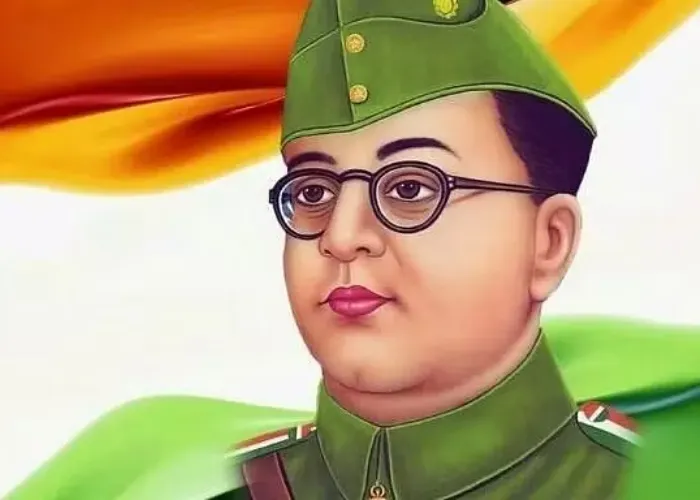
Subhash Chandra Bose was a great Indian nationalist leader who fought for India’s independence from the British rule. He was born on January 23, 1897, in Cuttack, Orissa, India. He was the ninth child of his parents, and his father was a lawyer.
Subhash Chandra Bose was an intelligent student who performed very well in academics. He was a brilliant debater and won several awards in debates and essay competitions. After completing his studies, he decided to join the Indian National Congress and work towards India’s independence.
In 1921, he became the president of the Indian National Congress, and he was the youngest person to hold this position. However, he soon realized that the Congress’s non-violent methods were not effective in achieving India’s independence, and he decided to form his army.
In 1942, Subhash Chandra Bose formed the Indian National Army (INA) with the help of Japanese forces. The INA fought alongside the Japanese army during World War II, hoping to gain India’s independence. However, they were defeated, and Subhash Chandra Bose died in a plane crash in 1945.
Subhash Chandra Bose was a true patriot who dedicated his life to India’s independence. He was known for his bravery, leadership, and determination. His famous slogan “Jai Hind” still resonates with every Indian, and he continues to inspire millions of people.
In conclusion, Subhash Chandra Bose was a remarkable leader who played a significant role in India’s struggle for independence. He will always be remembered as one of India’s greatest heroes, and his legacy will continue to inspire generations to come.
Subhash Chandra Bose Essay in 500 Words
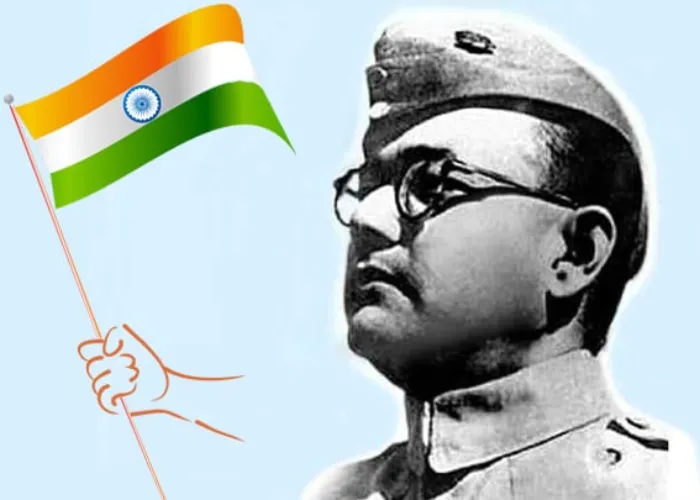
Subhash Chandra Bose is an important figure in Indian history. He was a leader who played a significant role in India’s fight for independence from British colonial rule. Bose was born in Cuttack, Orissa, in 1897. He grew up in a family that was active in the Indian independence movement, and he was deeply influenced by his parents’ political beliefs.
Early life of Subhash Chandra Bose
Bose was an excellent student and was always interested in politics. He completed his education in Calcutta, where he obtained a degree in philosophy. After completing his studies, Bose joined the Indian National Congress, the leading political party in the country at that time.
Political career of Subhash Chandra Bose
Bose quickly rose through the ranks of the Congress party and became one of its most prominent leaders. However, he had disagreements with Mahatma Gandhi and other leaders in the Congress. Bose believed that India needed to take a more radical approach to gain independence from British rule.
In 1939, Bose resigned from the Congress and formed his own political party, called the Forward Bloc. This party was dedicated to achieving Indian independence through any means necessary, including the use of force.
Contributions to Indian independence
During World War II, Bose saw an opportunity to gain support from other countries in the fight for Indian independence. He traveled to Germany and Japan to seek their help in the struggle against the British. Bose believed that if India could gain the support of these powerful nations, it would be able to achieve independence.
Bose also formed the Indian National Army (INA), which was made up of Indian soldiers who had been captured by the Japanese army. The INA fought alongside Japanese forces in Burma and India, and it was hoped that their efforts would help to drive the British out of the country.
Although Bose’s efforts to gain support from other countries were ultimately unsuccessful, he played an important role in India’s fight for independence. His leadership and determination inspired many Indians to continue the struggle for freedom, even after he had passed away.
Legacy of Subhash Chandra Bose
Subhash Chandra Bose is remembered today as a hero of Indian independence. His legacy is celebrated in many ways throughout the country. There are streets, parks, and buildings named after him, and his life story is taught to children in schools across India.
Bose’s contributions to Indian independence have inspired many people, both in India and around the world. His determination and courage in the face of adversity are qualities that continue to inspire generations of people to fight for justice and freedom.
Subhash Chandra Bose was a leader who played a crucial role in India’s fight for independence from British colonial rule. He was a man of great courage and determination, who inspired many others to join the struggle for freedom. Bose’s legacy continues to be celebrated in India today, and his life story serves as an inspiration to people all over the world.
Subhash Chandra Bose Essay 10 Lines
- Subhash Chandra Bose was an Indian nationalist leader and a prominent figure in the Indian independence movement against British colonial rule in the early to mid-20th century.
- He was born on January 23, 1897, in Cuttack, Odisha, and was educated at the University of Calcutta, where he studied philosophy.
- Bose became involved in the Indian National Congress in the 1920s and was elected president of the party in 1938.
- He is known for his advocacy of complete independence for India and his opposition to the nonviolent civil disobedience approach advocated by Mahatma Gandhi.
- In 1940, Bose was expelled from the Congress Party and formed the Forward Bloc, a left-leaning political organization that called for India’s immediate independence.
- During World War II, Bose sought the help of Axis powers to gain India’s independence and formed the Indian National Army (INA) to fight alongside the Japanese against the British.
- Bose’s role in the INA and his support for the Axis powers during the war remains a controversial topic to this day.
- Bose’s disappearance in 1945, following the crash of an aircraft in which he was traveling, remains a mystery and has given rise to numerous conspiracy theories.
- Bose is remembered as a hero in India for his bravery, patriotism, and dedication to the cause of Indian independence.
- His legacy has been celebrated through numerous books, films, and monuments, including the Bose National Centre for Basic Sciences in Kolkata, India.
Subhash Chandra Bose Essay 20 Lines
- Subhash Chandra Bose was born on January 23, 1897, in Cuttack, Odisha.
- He was an Indian nationalist who played a prominent role in the Indian independence movement.
- Bose was educated in England and later became involved in the Indian National Congress.
- In 1928, he became the president of the Indian National Congress, but he resigned from the party in 1939 due to ideological differences.
- Bose formed the Forward Bloc in 1939, which aimed to unite all anti-British forces in India.
- During World War II, Bose sought the help of Germany and Japan to gain support for India’s independence.
- He formed the Indian National Army (INA) in 1942, which was made up of Indian prisoners of war and civilians living abroad.
- Bose believed in armed struggle as a means of achieving independence for India.
- In 1943, he established the Provisional Government of Free India in Singapore with himself as the head of state.
- Bose was known for his charismatic personality and strong leadership.
- He was also a prolific writer and wrote extensively on the Indian independence movement and his own experiences.
- Bose is famous for his slogan “Jai Hind” which means “Victory to India”.
- He died in a plane crash on August 18, 1945, under controversial circumstances.
- Bose is revered as a national hero in India and his birthday is celebrated as a national holiday in some states.
- The Indian government has posthumously awarded him the Bharat Ratna, the country’s highest civilian award.
- Bose is also remembered for his contributions to the Indian National Army and his role in the Indian independence movement.
- There are several memorials and museums dedicated to Bose in India and abroad.
- Bose’s life and legacy continue to inspire people in India and around the world.
- Several books, films, and documentaries have been made about Bose and his life.
- Bose remains a controversial figure in Indian history, with some viewing him as a hero and others as a nationalist extremist.
FAQs
What is the format of a Subhash Chandra Bose essay?
The format of a Subhash Chandra Bose essay typically includes an introduction that gives a brief background on his life and achievements, followed by a body that discusses his contributions to the Indian independence movement, his leadership in the Indian National Congress, his formation of the Indian National Army, and his impact on India’s history. The essay should end with a conclusion that summarizes his legacy and relevance to the present day.
What are some topics that can be covered in a Subhash Chandra Bose essay?
Some topics that can be covered in a Subhash Chandra Bose essay include his early life and education, his political activism and involvement in the Indian National Congress, his formation of the Indian National Army, his role in the Quit India Movement, his relationship with other Indian nationalist leaders such as Mahatma Gandhi and Jawaharlal Nehru, and his legacy and impact on India’s history.
What are some tips for writing a good Subhash Chandra Bose essay?
Some tips for writing a good Subhash Chandra Bose essay include doing thorough research on his life and contributions to the Indian independence movement, organizing your thoughts and ideas in a clear and logical manner, using strong and vivid language to convey your ideas, and proofreading your essay for grammatical and spelling errors. It is also important to avoid plagiarism by citing your sources properly.
